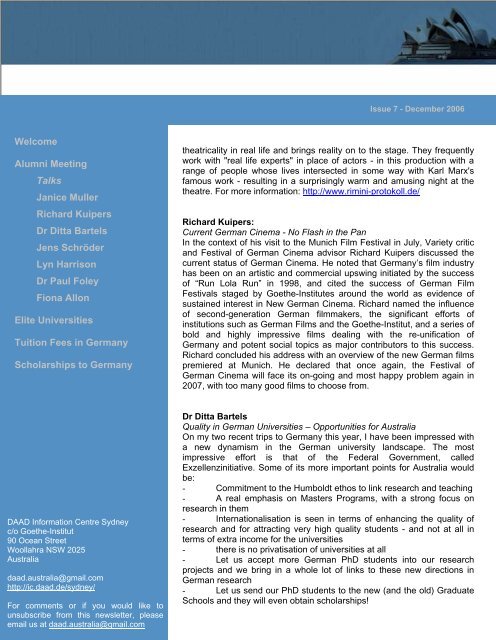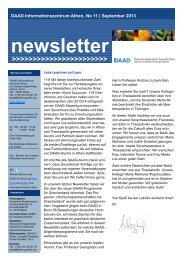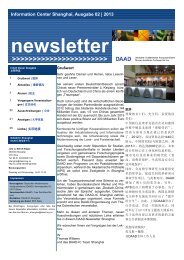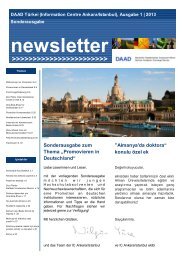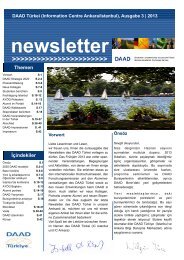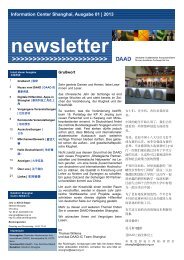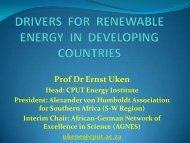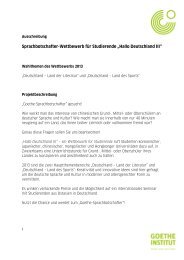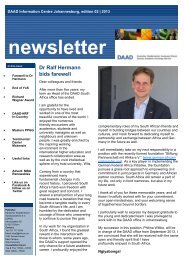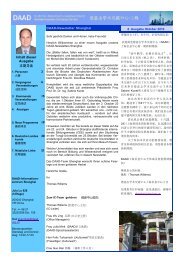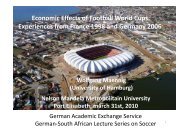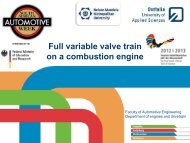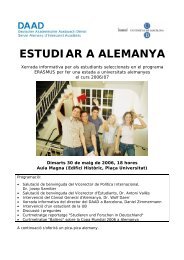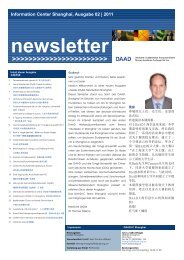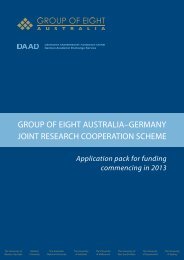Issue 7, December 2006 - DAAD
Issue 7, December 2006 - DAAD
Issue 7, December 2006 - DAAD
You also want an ePaper? Increase the reach of your titles
YUMPU automatically turns print PDFs into web optimized ePapers that Google loves.
<strong>Issue</strong> 7 - <strong>December</strong> <strong>2006</strong><br />
Welcome<br />
Alumni Meeting<br />
Talks<br />
Janice Muller<br />
Richard Kuipers<br />
Dr Ditta Bartels<br />
Jens Schröder<br />
Lyn Harrison<br />
Dr Paul Foley<br />
Fiona Allon<br />
Elite Universities<br />
Tuition Fees in Germany<br />
Scholarships to Germany<br />
theatricality in real life and brings reality on to the stage. They frequently<br />
work with "real life experts" in place of actors - in this production with a<br />
range of people whose lives intersected in some way with Karl Marx's<br />
famous work - resulting in a surprisingly warm and amusing night at the<br />
theatre. For more information: http://www.rimini-protokoll.de/<br />
Richard Kuipers:<br />
Current German Cinema - No Flash in the Pan<br />
In the context of his visit to the Munich Film Festival in July, Variety critic<br />
and Festival of German Cinema advisor Richard Kuipers discussed the<br />
current status of German Cinema. He noted that Germany’s film industry<br />
has been on an artistic and commercial upswing initiated by the success<br />
of “Run Lola Run” in 1998, and cited the success of German Film<br />
Festivals staged by Goethe-Institutes around the world as evidence of<br />
sustained interest in New German Cinema. Richard named the influence<br />
of second-generation German filmmakers, the significant efforts of<br />
institutions such as German Films and the Goethe-Institut, and a series of<br />
bold and highly impressive films dealing with the re-unification of<br />
Germany and potent social topics as major contributors to this success.<br />
Richard concluded his address with an overview of the new German films<br />
premiered at Munich. He declared that once again, the Festival of<br />
German Cinema will face its on-going and most happy problem again in<br />
2007, with too many good films to choose from.<br />
<strong>DAAD</strong> Information Centre Sydney<br />
c/o Goethe-Institut<br />
90 Ocean Street<br />
Woollahra NSW 2025<br />
Australia<br />
daad.australia@gmail.com<br />
http://ic.daad.de/sydney/<br />
For comments or if you would like to<br />
unsubscribe from this newsletter, please<br />
email us at daad.australia@gmail.com<br />
Dr Ditta Bartels<br />
Quality in German Universities – Opportunities for Australia<br />
On my two recent trips to Germany this year, I have been impressed with<br />
a new dynamism in the German university landscape. The most<br />
impressive effort is that of the Federal Government, called<br />
Exzellenzinitiative. Some of its more important points for Australia would<br />
be:<br />
- Commitment to the Humboldt ethos to link research and teaching<br />
- A real emphasis on Masters Programs, with a strong focus on<br />
research in them<br />
- Internationalisation is seen in terms of enhancing the quality of<br />
research and for attracting very high quality students - and not at all in<br />
terms of extra income for the universities<br />
- there is no privatisation of universities at all<br />
- Let us accept more German PhD students into our research<br />
projects and we bring in a whole lot of links to these new directions in<br />
German research<br />
- Let us send our PhD students to the new (and the old) Graduate<br />
Schools and they will even obtain scholarships!


